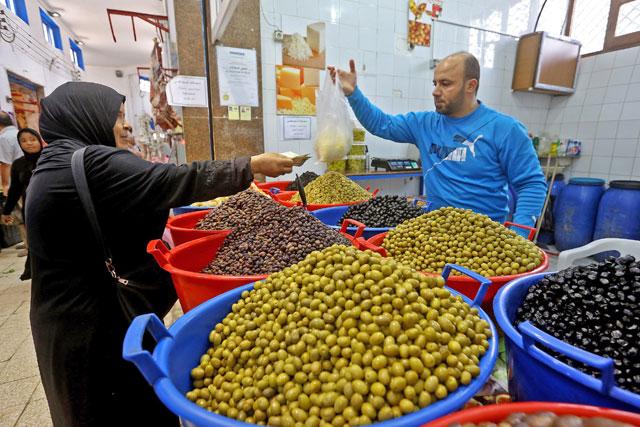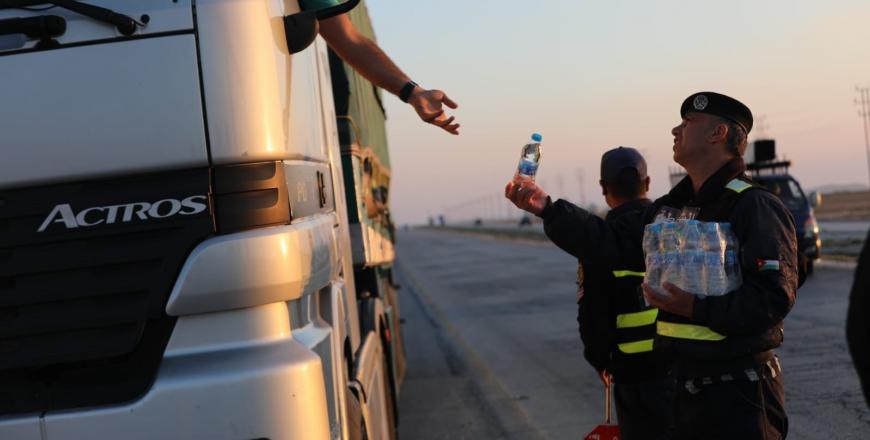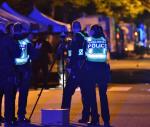You are here
Cash-strapped and fearing war Tripoli residents grim as Ramadan looms
By AFP - May 04,2019 - Last updated at May 04,2019

A Libyan woman buys olives at a market as residents of the capital Tripoli get ready for the beginning of the fasting month of Ramadan on Wednesday (AFP photo)
TRIPOLI — Shoppers throng Tripoli's Souk Al Hout market but their mood is sombre as Libya's capital is again hit by violence and prices have shot up ahead of the Muslim holy month of Ramadan.
"Our country is famous for its dates," a staple which Muslims eat first to break the Ramadan dawn-to-dusk fast, says shopkeeper Abdallah Al Chaibi.
"But no one is able to buy them because their price has doubled," he adds as he struggles to woo shoppers to buy the celebrated degla variety which are grown in south-eastern Libya.
"I cannot imagine an Iftar without dates," he says.
During Ramadan, Muslims around the world abstain from eating, drinking and smoking from dawn to dusk.
They break the fast with a meal known as Iftar and before dawn they have a second opportunity to eat and drink during suhur.
In the days ahead of Ramadan — which begins on May 5 this year — families embark on shopping sprees to stock up on food for the Iftar meal, which is often a feast that draws friends and relatives.
But renewed clashes between rival forces in and around Tripoli, a cash shortage and rising prices mean that this year's Iftar will be more frugal than those of previous years, and in oil-rich Libya that hurts.
"A large part of the population is unable to buy even basic items and guaranteeing [Iftar] meals has become a challenge," says Chaibi.
"In a wealthy country like Libya we are not used to this."
Libya has been plagued by chaos, violence and economic hardship since the ouster of dictator Muammar Qadhafi in a NATO-backed uprising in 2011.
On April 4, violence flared when military strongman Khalifa Haftar launched an offensive to seize Tripoli, seat of the internationally recognised Government of National Accord (GNA).
Fierce fighting has been pitting Haftar's self-style Libyan National Army against GNA forces backed by powerful militias in Tripoli's southern suburbs.
‘War awaits us’
The clashes have killed 376 people according to the World Health Organisation.
More than 40,000 have been displaced, according to the UN, but the figure does not include the many families who have sought safety with relatives.
"This will be the most difficult Ramadan in years," said Malek Mohamad, as he made his along Rashid Street in the covered Souk Al Hout market, where shoppers can find everything from fish to spices.
He said the fighting had forced thousands of residents of southern districts to flee with just a few of their belongings. "They now have to buy things and this will eat into their meagre budgets," he said.
Since 2011, insecurity and shortages have been part of the daily lives of Libyans. Economic reforms launched last year were supposed to tackle a chronic lack of liquidity, but have been hit by the flare-up.
"Every time there is a glimmer of hope, a new military conflict erupts among Libyans," says Mohamed Al Noueri, who ekes out a living selling spices and garlic from a tiny stall in the market.
Noueri, 69, says he is responsible for the needs of a family of 10, including a daughter with a physical disability and sons who study at university.
He himself is diabetic and says he "struggles to buy my medication".
"I am tired like many other [Libyans] who try to resist year upon year. And now war awaits us," he adds, his face wrinkled and sad.
Housewife Manal Khayri is also desolate on the eve of Ramadan.
"I spent three days queuing outside a bank and only managed to withdraw 500 dinars [around $350, 320 euros]," she says.
"This will be barely enough to cover our needs for the first week of Ramadan," says the mother of four as she shopped for pulses for her Iftar meals.
"I pray to God to bring the Libyan people closer to each other," she adds.
Authorities say they have taken measures to ensure there will be no shortages of basic food products during Ramadan.
Charities are planning to organise free Iftar meals for the needy, including those displaced by the latest fighting.
Related Articles
AMMAN — Consumer demand has decreased by more than 25 per cent since the beginning of the holy month of Ramadan, according to downtown
BENGHAZI, Libya — Eleven soldiers were killed and 55 wounded on day one of an offensive against extremist groups in Benghazi, the news agenc
AMMAN — The Public Security Directorate (PSD) is continuing with its Ramadan initiative, "Slow down, have your iftar with us", which ai

















